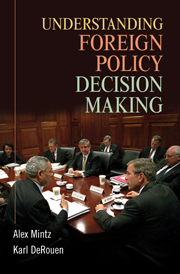Book contents
- Frontmatter
- Contents
- Acknowledgments
- PART ONE INTRODUCTION
- PART TWO THE DECISION ENVIRONMENT
- PART THREE MODELS OF DECISION MAKING
- PART FOUR DETERMINANTS OF FOREIGN POLICY DECISION MAKING
- PART FIVE MARKETING FOREIGN POLICY
- PART SIX CONCLUSION
- 9 Conclusion
- Appendix: Foreign Policy Simulation and Exercise
- References
- Index
9 - Conclusion
Published online by Cambridge University Press: 05 June 2012
- Frontmatter
- Contents
- Acknowledgments
- PART ONE INTRODUCTION
- PART TWO THE DECISION ENVIRONMENT
- PART THREE MODELS OF DECISION MAKING
- PART FOUR DETERMINANTS OF FOREIGN POLICY DECISION MAKING
- PART FIVE MARKETING FOREIGN POLICY
- PART SIX CONCLUSION
- 9 Conclusion
- Appendix: Foreign Policy Simulation and Exercise
- References
- Index
Summary
Foreign policy problems are inherently complex (Steinbruner 1974, 2002). Consequently, making foreign policy decisions is a complicated task with wide-ranging ramifications. Foreign policy decisions are made by a single leader (e.g., the president), a group (e.g., Congress), or a coalition (e.g., in parliamentary democracy). There are several types of decisions: one-shot single decisions, interactive decisions, sequential decisions, and sequential-interactive decisions. Foreign policy decisions are influenced by the personality of leaders, the foreign policy environment, international and domestic factors, decision setting, and decision dynamics. Decisions affect subsequent decisions and often set a “path” for new decisions.
Foreign policy decisions are typically made in an interactive setting (i.e., involving an opponent, an ally, or both) and under dynamic conditions (in which new information enters the decision situation during crisis). The foreign policy environment is typically characterized by a high level of uncertainty, considerable risk, and incomplete information, and decisions often have to be made in unfamiliar settings.
Foreign policy decisions are often made under time and information constraints; involve value-tradeoffs and sunk costs; are influenced by perceptions and misperceptions, images and belief systems, emotions, and internal political and economic calculations; and are shaped by the personality of leaders, miscalculations, agendas, and interests.
Foreign policy decisions are also affected by a series of international influences such as deterrence, the arms race, strategic surprise, the regime type of the adversary, alliances, and so on. Leaders are susceptible to cognitive biases and errors in making foreign policy decisions.
- Type
- Chapter
- Information
- Understanding Foreign Policy Decision Making , pp. 169 - 176Publisher: Cambridge University PressPrint publication year: 2010



